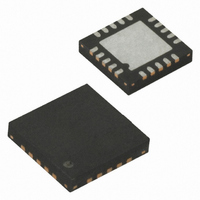ATTINY43U-MU Atmel, ATTINY43U-MU Datasheet - Page 46

ATTINY43U-MU
Manufacturer Part Number
ATTINY43U-MU
Description
MCU AVR 4K FLASH 8MHZ 20-QFN
Manufacturer
Atmel
Series
AVR® ATtinyr
Specifications of ATTINY43U-MU
Core Processor
AVR
Core Size
8-Bit
Speed
8MHz
Connectivity
USI
Peripherals
Brown-out Detect/Reset, POR, PWM, Temp Sensor, WDT
Number Of I /o
16
Program Memory Size
4KB (2K x 16)
Program Memory Type
FLASH
Eeprom Size
64 x 8
Ram Size
256 x 8
Voltage - Supply (vcc/vdd)
1.8 V ~ 5.5 V
Data Converters
A/D 4x10b
Oscillator Type
Internal
Operating Temperature
-40°C ~ 85°C
Package / Case
20-MLF®, QFN
Processor Series
ATTINY4x
Core
AVR8
Data Bus Width
8 bit
Data Ram Size
256 B
Interface Type
SPI
Maximum Clock Frequency
8 MHz
Number Of Programmable I/os
16
Number Of Timers
2
Maximum Operating Temperature
+ 85 C
Mounting Style
SMD/SMT
3rd Party Development Tools
EWAVR, EWAVR-BL
Development Tools By Supplier
ATAVRDRAGON, ATSTK500, ATSTK600, ATAVRISP2, ATAVRONEKIT
Minimum Operating Temperature
- 40 C
On-chip Adc
10 bit, 4 Channel
For Use With
ATSTK600-TINYX3U - STK600 SOCKET/ADAPTER TINYX3U
Lead Free Status / RoHS Status
Lead free / RoHS Compliant
8.7
8.8
8.9
8.10
46
Typical Applications
Characteristics
Potential Limitations
Bypassing the Boost Converter
ATtiny43U
A typical use of the boost converter is illustrated in
optimized depending on the type of application.
three different types of applications (cost effective, high output current and long battery life). All
values are guidelines, only.
Table 8-2.
Notes:
Electrical characteristics of the boost converter are given in
characteristics can be found under section
When the device is powered via the boost converter some usage limitiations may apply. For
example, the highest allowed operating frequency of the device depends on supply voltage (see
“Speed Grades” on page
given in
into Active Low Current Mode the supply voltage will drop periodically, affecting the maximum
allowed operating frequency.
Provided the load current remains sufficiently high the boost converter will never enter Active
Low Current Mode and the supply voltage will remain high enough to run the device at higher
frequencies. The boost converter status bit BS can be used to determine if the boost converter is
in Low Current Mode (see
Since the entire device is powered from the boost converter output variations will show in all
peripherals. This means that, for example, high levels of I/O pins may vary with supply voltage.
It is possible to bypass and disable the boost converter so that the device can be powered
directly from an external supply. To force the boost converter into Stop Mode, connect pin V
to ground and provide the device with supply directly to the V
Symbol
L
D
R
C
C
C
C
1
1
1
1
2
3
4
1. Low ESR required.
2. High reverse leakage current, increases current consumption.
3. The diode is the largest individual contributor to battery life. The example diode keeps the
4. Depends on internal resistance of power supply.
5. Depends on load current. May not be sufficient for maximum current rating.
Table 20-7 on page
boost converter running and maintains a reasonable efficiency level.
Component
Inductor
Schottky diode
Resistor
Input Capacitor
Secondary Input Cap.
Output Capacitor
Secondary Output Cap.
Recommended Components and Values for Various Designs
156) and the boost converter output voltage varies within the limits
“ADCSRB – ADC Control and Status Register B” on page
159. This means that if the design allows the boost converter to go
Cost Effective
10MQ100N
“Boost Converter” on page
10
1
680
100
15
–
(4)
(5)
Table
Figure 8-2 on page
8-2, below, presents recommendations for
High Current
10BQ015
15
100
680
CC
4.7
22
22
Table 20-7 on page
(1)
pin. To permanently disable the
(2)
165.
37. Components can be
Battery Life
10BQ040
15
680
100
4.7
22
22
(1)
8048B–AVR–03/09
(3)
159. Typical
47).
Unit
µH
µF
nF
µF
nF
Ω
BAT














